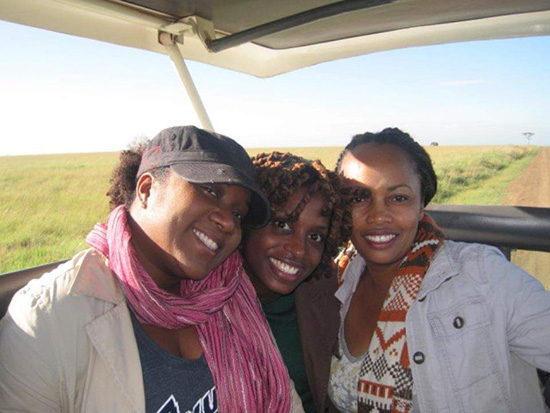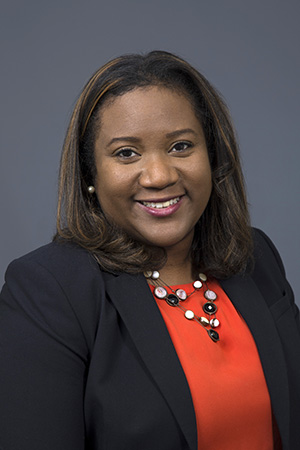5 Questions with Faculty: DeeDee Bennett
A Disaster Science Scholar Who Has Traveled the World
 |
|
DeeDee Bennett (left) at Masai Mara National Reserve in Kenya with friends Donna-Michelle and Njoki.
|
ALBANY, N.Y. (March 28, 2019) — DeeDee Bennett joined UAlbany this semester as an assistant professor in the College of Emergency Preparedness, Homeland Security, and Cybersecurity.
A native of Brooklyn, Bennett came to UAlbany from the University of Nebraska at Omaha, where she was an assistant professor, director of the Emergency Management and Disaster Science, and the 2018 winner of the Outstanding Academic Achievement Award from the Chancellor’s Commission on the Status of Women. Bennett also previously held an appointment as a research scientist at the Center for Advanced Communications Policy at Georgia Institute of Technology, where she maintains her status as an affiliate faculty.
Her primary research areas include emergency management, socially vulnerable populations during disasters, emergency communications, disaster policy, and mobile wireless communications. She received her bachelor’s in electrical engineering and her master’s in public policy from Georgia Tech, and her PhD in fire and emergency management from Oklahoma State University.
What research topics are you working on now?
My research is solely focused on disasters. I investigate the social, organizational and technical policy challenges related to communicating emergency messaging to frequently underserved populations. My recent publications are related to the investigation of interdisciplinary research in disaster science and an examination of emergency warnings through mobile wireless devices including text messaging, social media and the Wireless Emergency Alerts program.
 |
|
CEHC Assistant Professor DeeDee Bennett joined UAlbany this semester. (Photo by Patrick Dodson)
|
I am also the principal investigator for an NSF-funded grant “Minority Scholars from Under-Represented Groups in Engineering and the Social Sciences (SURGE) Capacity in Disasters.” The grant was developed to address the underrepresentation of racial and ethnic minorities in hazards and disaster research and the often disproportionate impacts of disasters on underserved, primarily racial and ethnic minority communities. This is one of the 69 “NSF INCLUDES” projects nationwide, which focus on diversity, inclusion and broadening participation in STEM fields.
What made you decide to pursue emergency management?
My decision to pursue emergency management started with electrical engineering and public policy. I initially planned to attend law school, but then instead stumbled upon a field that allows me to focus on my passions to both reduce vulnerabilities and increases disaster resilience. It is a unique story that highlights the importance of interdisciplinary research in the field.
If you weren’t teaching at a university, what would you be doing?
If not a professor, I would have continued on a research faculty track or pursued law. I was initially interested in intellectual property law.
How did you end up at UAlbany?
I have been in academia since 2004. My decision to accept a position at UAlbany was based on the creation of the first-in-the-nation College of Emergency Preparedness, Homeland Security, and Cybersecurity. The college’s faculty understand and support my research interests. Furthermore, I was impressed that the University’s president, Havidán Rodríguez, is also a leading social science disaster researcher.
What are some hobbies outside of work?
I love to travel. I have been to 38 states and nearly 20 countries. The furthest I have traveled is Kuala Lumpur, Malaysia. I also enjoy reading and keeping up with science fiction and superhero movies.
![]() For more news, subscribe to UAlbany's RSS headline feeds
For more news, subscribe to UAlbany's RSS headline feeds
A comprehensive public research university, the University at Albany-SUNY offers more than 120 undergraduate majors and minors and 125 master's, doctoral and graduate certificate programs. UAlbany is a leader among all New York State colleges and universities in such diverse fields as atmospheric and environmental sciences, business, education, public health,health sciences, criminal justice, emergency preparedness, engineering and applied sciences, informatics, public administration, social welfare and sociology, taught by an extensive roster of faculty experts. It also offers expanded academic and research opportunities for students through an affiliation with Albany Law School. With a curriculum enhanced by 600 study-abroad opportunities, UAlbany launches great careers.


